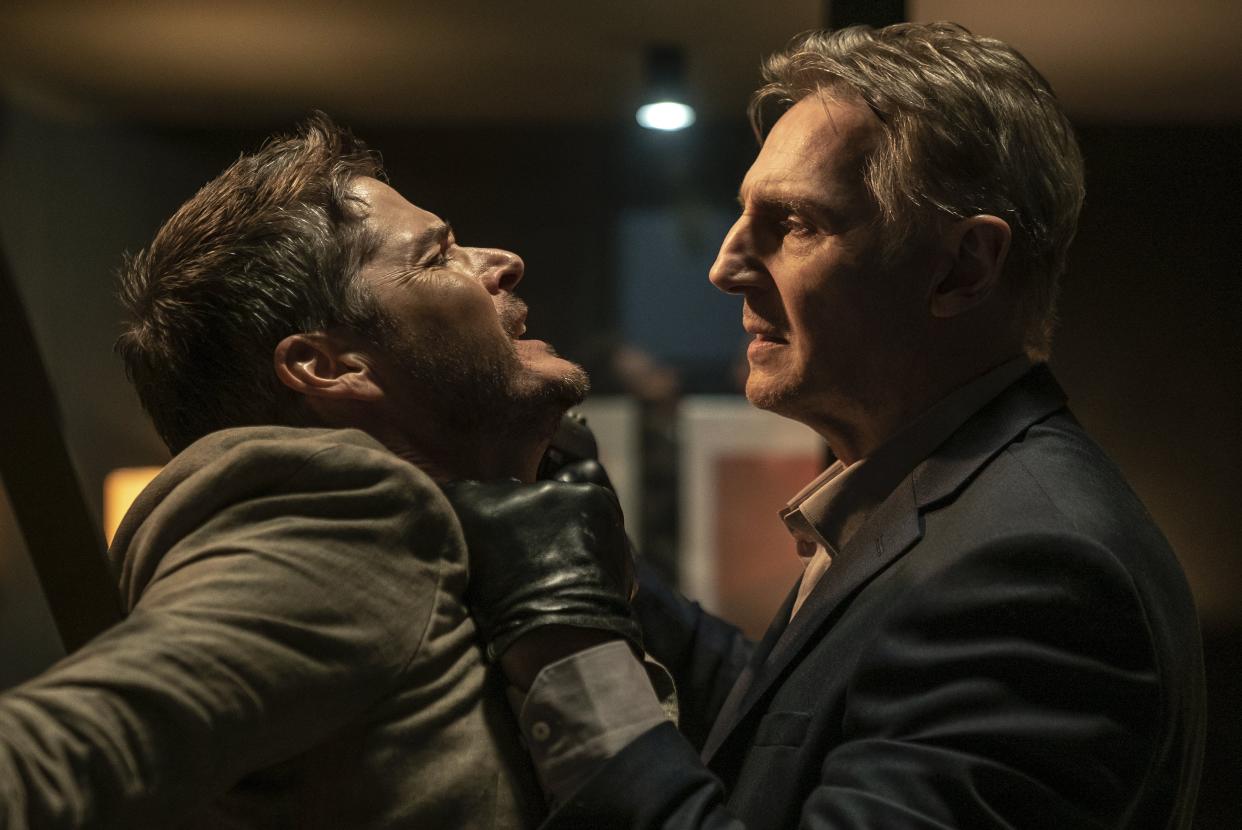"Memory," Neeson's latest, attempts to weave Alzheimer's, action plots together

There’s an earnest effort in the new Liam Neeson action film “Memory” to add a layer of complexity and emotion to an otherwise humdrum story.
Neeson again plays a professional killer — with “unique skills,” or what have you — but one suffering from probable Alzheimer’s disease.
One character labels the condition “late stages” in the script’s third act, but someone who has experience with Alzheimer's or other forms of dementia would rightly quibble with the description. If you’ve ever had the misfortune to see someone suffering in the advanced throes of that condition, you know they are unlikely to be fast on their feet while unraveling an international criminal plot.
Regardless, there’s something interesting about the idea of placing a tough guy in the most vulnerable of conditions. That our hero must struggle to keep track of basic things when his job is so high-risk and terrifying anyway. Not to mention the possibility of confronting the mind’s deterioration while the body is still very much intact.
“Memory” takes slight half-steps to confront such heavy themes. Little comfort when the story's execution reduces this awful disease to a parlor trick, the brain's degeneration showing up whenever Neeson’s character needs to remember where he left a flash drive with damning evidence. Or when he has some magic pills he keeps losing that somehow keep the disease from taking hold.
The film’s intentions aren’t exploitative, as I believe the filmmakers’ hearts are in the right place. But the illness becomes a cheap device that betrays the story’s reach.
More: How a new film and book dive deep into Nicolas Cage — the man, myth and legend
The plot — of which there is an overabundance — centers on Alex Lewis (Neeson), an assassin who crisscrosses the Mexico-U.S. border working for often-unseen parties with varied demands for death and mayhem.
Concurrently, a multinational team of law enforcement, led by FBI agent Vincent Serra (Guy Pearce), is trying to bust a massive sex trafficking ring involving very prominent persons who seem to continually unsettle the investigation’s progress.
The audience learns Alex’s list of targets are witnesses to grotesque, criminal perversities involving moving children across borders for the purpose of exploitation and abuse.
When Alex is contracted to kill an underaged victim, he draws the line. Even trained killers have standards! I mean, he has standards because you — as a member of the international film audience — have standards.
Yet, as Alex’s conscience begins to gnaw at him, his cognitive abilities get worse. We learn he has a brother who really does show signs of late-stage Alzheimer’s, so Neeson’s character knows his memory issues harken to something worse.
Moments between brothers offer poignancy, as Neeson digs into his considerable well of acting talent to convey much without saying anything at all, trying to reach his sibling who is quite simply lost to the ravages of his condition.
This angle distinguishes “Memory” from many of the films in Neeson’s second act of being an action star in what I like to call “divorced dad movies.” The pattern is the same: An older guy is quiet but very smart and fierce. A younger character, usually a daughter or a daughter-like surrogate, is taken away and placed in danger. Neeson’s character must untangle some Byzantine process to keep the child safe. Or die trying.
You can almost imagine a certain segment of the audience nodding its heads: “That’s right — I love my child and I need to be with them. That judge and my ex’s lawyer will regret not trusting me!”
More: How Robert Eggers' 'The Northman' spins an unlikely revenge story
With the film’s international trafficking conspiracy involving rich philanthropists and government officials, there’s a new menace added to the story given how it mirrors QAnon fantasies. Globalist plots are another trademark of the Angry Old Guy who believes their life's frustrations must be in the hands of powerful people who cannot be held otherwise to account.
Standard action junk and it’s rough to see such an able hand like director Martin Campbell — who jump-started James Bond twice with “GoldenEye” and “Casino Royale” — doing routine fare. To paraphrase Norma Desmond, he didn’t get small. But the action set pieces and the budgets did.
Glimpses of “Memory” promise a better movie that Campbell could easily deliver. There are small moments where you see a pause in the plot, and a longing in a character’s eye that reveals subtext about age, regret and trying to make the most of life before the proverbial lights shut out.
Certainly there’s talent trying their best to bring these themes to the surface. Although the presence of Pearce will just remind you of “Memento,” an incredible film about crime and recollection. This new film event rips off that earlier story when the hired killer writes messages on his arm to remember critical details. No film should remind you of a better movie you could be watching.
“Memory” comes close to doing something revelatory. Yet it remains far away enough to be frustrating.
In real life, James Owen is a lawyer and executive director of energy policy group Renew Missouri. He created/wrote for Filmsnobs.com from 2001-2007 before an extended stint as an on-air film critic for KY3, the NBC affiliate in Springfield. He was named a Top 20 Artist under the Age of 30 by The Kansas City Star when he was much younger than he is now.
This article originally appeared on Columbia Daily Tribune: Neeson's latest falls short in uniting Alzheimer's, action plots

